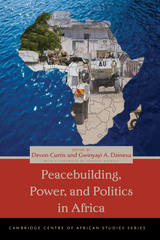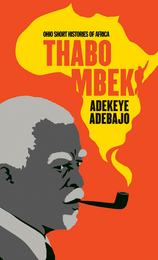
Peacebuilding, Power, and Politics in Africa is a critical reflection on peacebuilding efforts in Africa. The authors expose the tensions and contradictions in different clusters of peacebuilding activities, including peace negotiations; statebuilding; security sector governance; and disarmament, demobilization, and reintegration. Essays also address the institutional framework for peacebuilding in Africa and the ideological underpinnings of key institutions, including the African Union, NEPAD, the African Development Bank, the Pan-African Ministers Conference for Public and Civil Service, the UN Peacebuilding Commission, the World Bank, and the International Criminal Court. The volume includes on-the-ground case study chapters on Sudan, the Great Lakes Region of Africa, Sierra Leone and Liberia, the Niger Delta, Southern Africa, and Somalia, analyzing how peacebuilding operates in particular African contexts.
The authors adopt a variety of approaches, but they share a conviction that peacebuilding in Africa is not a script that is authored solely in Western capitals and in the corridors of the United Nations. Rather, the writers in this volume focus on the interaction between local and global ideas and practices in the reconstitution of authority and livelihoods after conflict. The book systematically showcases the tensions that occur within and between the many actors involved in the peacebuilding industry, as well as their intended beneficiaries. It looks at the multiple ways in which peacebuilding ideas and initiatives are reinforced, questioned, reappropriated, and redesigned by different African actors.
A joint project between the Centre for Conflict Resolution in Cape Town, South Africa, and the Centre of African Studies at the University of Cambridge.

Former South African president Thabo Mbeki is a complex figure. He was a committed young Marxist who, while in power, embraced conservative economic policies and protected white corporate interests; a rational and dispassionate thinker who was particularly sensitive to criticism and dissent; and a champion of African self-reliance who relied excessively on foreign capital.
As a key liberation leader in exile, he was instrumental in the ANC’s antiapartheid struggle. Later, he helped build one of the world’s most respected constitutional democracies. As president, though, he was unable to overcome inherited socioeconomic challenges, and his disastrous AIDS policies will remain a major blotch on his legacy.
Mbeki is the most important African political figure of his generation. He will be remembered as a foreign policy president for his peacemaking efforts and his role in building continental institutions, not least of which was the African Union. In this concise biography, ideally suited for the classroom, Adekeye Adebajo seeks to illuminate Mbeki’s contradictions and situate him in a pan-African pantheon.
READERS
Browse our collection.
PUBLISHERS
See BiblioVault's publisher services.
STUDENT SERVICES
Files for college accessibility offices.
UChicago Accessibility Resources
home | accessibility | search | about | contact us
BiblioVault ® 2001 - 2024
The University of Chicago Press









